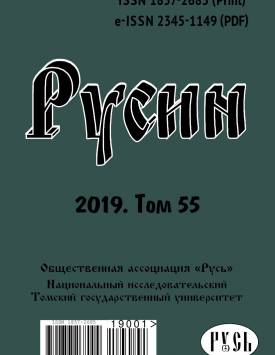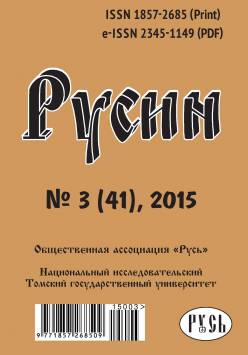Moldavian campaigns of Ukrainian Cossacks the 1570s
The article focuses on the Cossack campaigns in the Moldavian principality of the 1570s and their intensification after the formation of the Registered troops in the Polish-Lithuanian Commonwealth (Rzech Pospolita), when the Cossacks got the estate rights and privileges. The registrants had to serve in the frontier, yet they often carried out sea and overland campaigns to the Ottoman Empire together with Zaporozhian Cossacks. During the expeditions, the Cossacks not only acquired the so-called “Cossack bread”, but also freed Ukrainian prisoners from captivity and interfered in the internal affairs of the neighbouring states, being supported by local government officials at the southern border, who received their share of the profit. The Turkish conquest of Moldova brought about political instability due to the struggle for the royal throne. Having got it, a nominee had to get the support of the sultan, which cost a lot of money. This situation was actively used by sovereigns and authorities of Poland, Transylvania, Voloshchyna. Subsequently, Ukrainian Cossacks began to join in as a powerful military force. The vivid intervention episode was the case of Ivan Pidkova. At the request of Moldavian boyars, who recognized him as the brother to John III the Terrible, murdered by the Turks, he organized a military campaign in the autumn of 1577. After gaining the capital of the Principality, Iassy, Pidkova was proclaimed monarch, and asked Sultan to enthrone him in Moldova. Sultan Murad III arranged his troops in the Danube states and helped Peter the Lame to regain the lost throne. On returning to Ukraine, Pidkova was arrested by the order of King Stephen Bathory and executed in Lviv. However, his public execution did not prevent the Cossacks from trying to seize Moldova again.
Keywords
Молдавское княжество,
казацкие походы,
Иван Подкова,
Турция,
Речь Посполитая,
Moldavian principality,
Cossack campaigns,
Ivan Pidkova,
Turkey,
Rzech Pospolita,
Молдавське князівство,
походи козаків,
Іван Підкова,
Туреччина,
Річ ПосполитаAuthors
| Shcherbak Vitalii O. | Borys Grinchenko Kyiv University | v.shcherbak@kubg.edu.ua |
Всего: 1
References
Винар Л. Князь Дмитро Вишневецький. Силуети епох. Дрогобич, 1992. 184 c.
Олександр Гваньїні. Хроніка Європейської Сарматії. Київ: Києво-Могилянська академія, 2009. 1006 с.
Володимир Голобуцький. Запорозьке козацтво. Київ: Вища школа, 1994. 439 с.
Грушевський М.С. Історія України-Руси. Київ: Наукова думка, 1995. Т. 7. 624 с.
Історія Львова в документах і матеріалах. Збірник документів та матеріалів. Київ: Наукова думка, 1986. 320 с.
Исторические связи народов СССР и Румынии в XV - начале XVIII в. Документы и материалы. М.: Наука, 1965. Т. 1. 363 с.
Леп’явко С.А. Українське козацтво у міжнародних відносинах (1561-1591). Чернігів: Сіверянська думка, 1999. 212 с.
Антоний Мойсей, Аркадий Мойсей. Украинцы в этнокультурных стереотипах молдавских летописцев, румынских историков и писателей: образ Ивана Подковы - казацкого предводителя и молдавского князя // Codrul Cosminului. Annul XX. № 1. С. 25-48.
Мохов Н. Боевое содружество украинских казаков и молдаван в 70-80-х годах XVI в. и деятельность И. Подковы // Ученые записки Института истории, языка и литературы Молдавского филиала АН СССР. Серия историческая. 1957. Т. 6. С. 29-41.
Мохов Н.А. Очерки истории молдавско-русско-украинских связей. Кишинев: Штиница, 1961. 214 с.
Стороженко А. Стефан Баторий и днепровское казачество. Киев, 1904. 327 c.
Тверитинова А.С. Письмо турецкого султана Мурада III польскому королю Стефану Баторию // Восточные документы по истории народов Юго-Восточной и Центральной Европы. М., 1974. Т. 3. С. 295-308.
Хашдеу Богдан. Иоан-Водэ чел Кумплит // Опере алесе. Кишинэу: Картя молдовеняскэ, 1967. Вол. ІІ. П. 7-137.
Яворницький Д.І. Історія запорозьких козаків. Київ: Наукова думка, 1990. Т. 2. 558 с.
Akta historyczne do panowania Stefana Batorego króla Polskiego. Warszawa, 1881. 325 s.
Tiberiu Ciobanu, Ioan Nicoară Potcoavă, domn al Moldovei (1537-1558). URL: http//www.agerostuttgart.de/REVISTA-AGERO/ISTORIE/Ioan%20Nicoara%20Potcoava%20de%20 Tiberiu%20Ciobanu.htm (останній перегляд: 20 December 2013).
Documente privind istoria României (Moldova). Sec. XVI. Bucureşti, 1953, Vol. III, doc. 514. 425 p.
Eudoxiu Hurmuzaki. Documente privitoare la Іstoria Românilor. Bucureşti, 1900. XI. P. XXXIV. Note 3.
Grabowski A. Starożytnosci historyczne Polskie. Kraków, 1840. T. 2. 534 s.
Polska Marcina Bielskiego, ed. K. J. Turowski. Sanok, 1856. T. 3. S. 1223-1790.
Listy Annibała z Kapui, arcybiskupa Neapolitańskiego, nuncyusza w Polsce. Warszawa, 1852. 372 s.
Początki panowania w Polsce Stefana Batorego. 1575-1577 // Żródła dziejówe. Warszawa, 1877. T. 4. 292 s.
Sokołowski A. Kilka słów o tureckiej polityce Stefana Batorego // Ateneum. Warszawa, 1886 (R.11). T. 1. Zeszyt 3. S. 515-534.
Spieralski Zd. Awantury mołdawskie. Warszawa, 1967. 248 s.
Sprawy wojenne króla Stefana Batorego. Kraków, 1877. 210 s.
Ureche G. Letopiseţul Ţării Moldovei... De la Dragoş-Vodă până la Aron-Vodă // Letopiseţul Ţării Moldovei. Grigore Ureche. Miron Costin. Ion Neculce / Ed. by T. Celac. Chişinău: Editura Universul, 2006.

